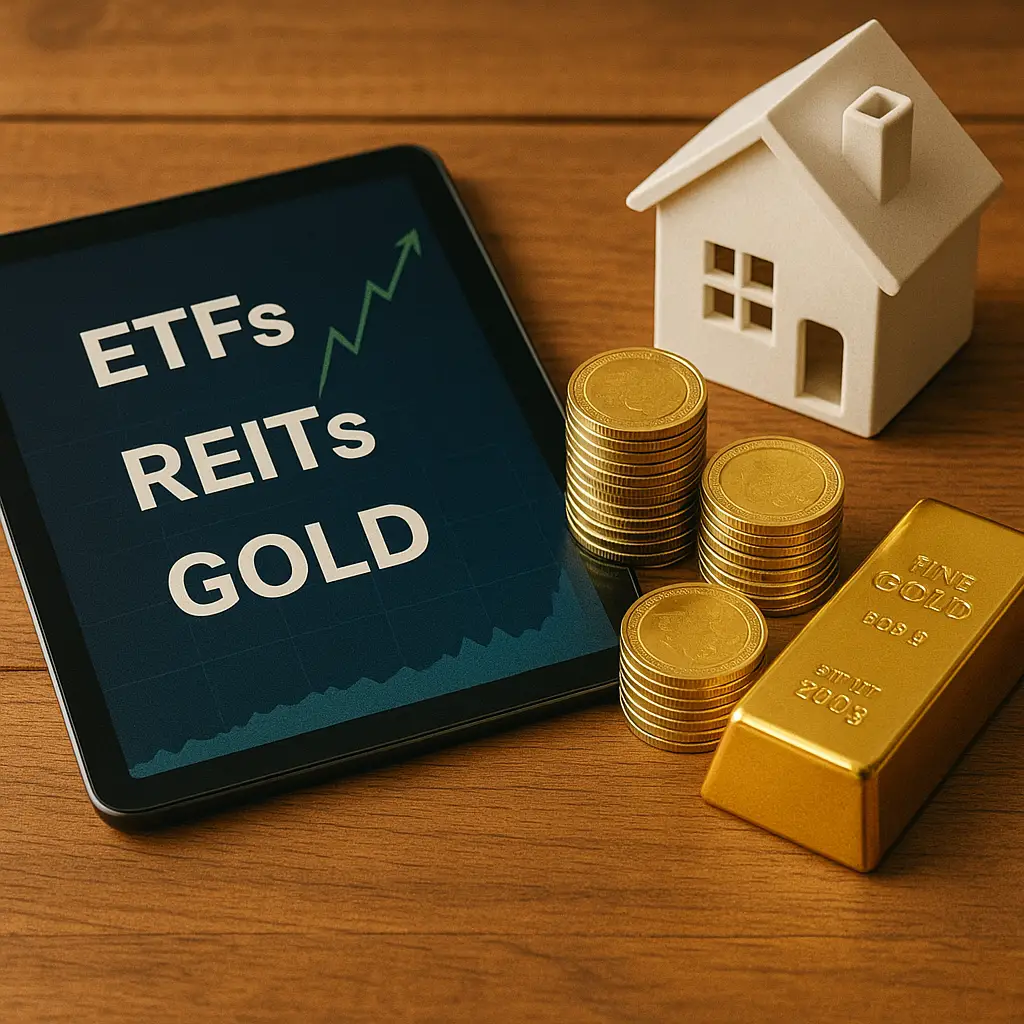
In India, most investors traditionally park their money in fixed deposits, gold jewelry, or — more recently — mutual funds and stocks. But today, as financial literacy grows and technology simplifies access, several smart alternatives are emerging.
Among them, three stand out for retail investors:
- ETFs (Exchange Traded Funds)
- REITs (Real Estate Investment Trusts)
- Digital Gold / Sovereign Gold Bonds
These options can:
- Lower risk
- Provide diversification
- Offer better liquidity
- Beat inflation over time
In this guide, you’ll understand what each of these is, how they work, and how you can include them in your investment strategy.
Section 1: What Are ETFs (Exchange Traded Funds)?
An ETF is a basket of securities — like a mutual fund — but trades like a stock on the stock exchange.
✅ Key Features:
- Passive investment (follows an index like Nifty 50, Sensex, etc.)
- Low cost (very low expense ratio)
- High liquidity
- Real-time trading on BSE/NSE
✅ Example:
The Nifty 50 ETF holds the same 50 companies in the Nifty index. So, by buying 1 unit of this ETF, you get exposure to the top companies in India.
Types of ETFs in India:
| Type | Example | Purpose |
|---|---|---|
| Index ETF | Nifty 50 ETF, Sensex ETF | Track market performance |
| Sectoral ETF | Banking ETF, IT ETF | Focus on specific industries |
| Gold ETF | Nippon Gold ETF, HDFC Gold ETF | Invest in gold digitally |
| International ETF | Motilal Oswal Nasdaq ETF | Exposure to global stocks |
| Bond ETF | Bharat Bond ETF | Safer, fixed-income investment |
Benefits of ETFs:
- Diversification in one click
- Cost-effective vs active mutual funds
- No fund manager bias
- Transparent – holdings updated daily
- Good for beginners looking to track the index
How to Invest in ETFs:
- Open a demat + trading account (Zerodha, Groww, Upstox)
- Choose the ETF (check volume/liquidity)
- Place a buy order just like a stock
- Track it in your portfolio
Note: ETFs don’t have SIPs directly (unlike mutual funds) but you can set up periodic buys manually.
Section 2: What Are REITs (Real Estate Investment Trusts)?
REITs are companies that own, operate, and manage income-generating real estate assets — like office buildings, malls, warehouses.
They collect rent from tenants and distribute profits to investors.
✅ Think of it like:
Instead of buying a ₹1 crore office space, you buy units of a REIT for ₹300–₹500 and earn a share of the rental income.
Popular REITs in India:
| REIT Name | Major Properties | Listed On |
|---|---|---|
| Embassy REIT | Commercial office spaces | NSE, BSE |
| Mindspace REIT | IT parks in Mumbai, Pune | NSE, BSE |
| Brookfield REIT | Business parks in Noida, Gurugram | NSE, BSE |
REIT Features:
- Dividend income + capital appreciation
- Minimum 90% of income must be distributed
- Typically pays quarterly/semi-annually
- Backed by physical real estate
- Ideal for long-term wealth creation + passive income
REITs vs Buying Property
| Feature | REITs | Buying Real Estate |
|---|---|---|
| Ticket Size | ₹300–₹500 per unit | ₹30 lakh+ upfront |
| Liquidity | High (via stock market) | Low (months to sell) |
| Maintenance | None | High ongoing costs |
| Diversification | Multiple properties | Just one |
| Income Source | Rent + capital gains | Rent + capital gains |
Conclusion: REITs allow average investors to benefit from real estate income without owning physical property.
How to Invest in REITs:
- Buy/sell like shares on NSE/BSE
- REITs are regulated by SEBI
- You can start with small amounts — ideal for young investors building passive income
Section 3: Gold: But the Smarter Way
Gold has always held emotional and economic value in Indian households. But physical gold has problems:
- Making charges
- Purity concerns
- Storage/safety
- Poor liquidity for resale
Enter: Gold ETFs and Sovereign Gold Bonds (SGBs)
A. Gold ETFs
These are funds that invest in 99.5% pure gold.
- Traded like stocks
- No physical delivery
- Ideal for tracking gold price
Return = market-linked gold price
B. Sovereign Gold Bonds (SGBs)
Issued by RBI on behalf of Government of India.
| Feature | SGB |
|---|---|
| Tenure | 8 years (exit after 5 years) |
| Returns | Gold price appreciation + 2.5% interest/year |
| Taxation | No capital gains tax on maturity |
| Minimum Investment | 1 gram of gold |
| Where to Buy | Banks, Post Offices, Brokers |
Ideal For:
Investors looking for long-term, safe exposure to gold + fixed income.
Gold ETFs vs SGBs vs Physical Gold
| Feature | Gold ETF | SGB | Physical Gold |
|---|---|---|---|
| Liquidity | High | Medium (exit only after 5 yrs) | Low |
| Storage Cost | None | None | High (locker fees) |
| Taxation | LTCG after 3 yrs | Tax-free at maturity | High (GST, charges) |
| Ideal For | Short-term | Long-term investors | Occasional gifting |
Section 4: Where Do These Fit in Your Portfolio?
| Investment Type | Risk Profile | Return Potential | Best For |
|---|---|---|---|
| ETFs (Index) | Low-Medium | 10–12% annually | Passive stock investing |
| REITs | Medium | 8–10% total return | Regular income + diversification |
| Gold (SGB) | Low | 6–8% avg. over 8 yrs | Wealth preservation, hedge |
Ideal Allocation Strategy:
| Asset Type | Suggested Allocation |
|---|---|
| Equity ETFs | 50–60% |
| REITs | 10–20% |
| Gold (SGBs/ETFs) | 5–10% |
| Others (FDs, Debt Funds) | 20–30% |
This ensures:
- Growth (via equity)
- Stability (via REITs, Gold)
- Passive income (via REITs/SGB interest)
Section 5: Taxation Overview
| Asset | Holding Period | Tax Rate |
|---|---|---|
| ETFs | <1 yr: STCG, >1 yr: LTCG | 15% STCG, 10% LTCG over ₹1L |
| REITs | Dividend taxable | Depends on income slab |
| SGB | 8 years maturity | Tax-free capital gains |
| Gold ETF | >3 years = LTCG | 20% with indexation |
Tip: Use SGBs for long-term and Gold ETFs for short-term flexibility.
Section 6: Pros and Cons Summary
| Investment | Pros | Cons |
|---|---|---|
| ETFs | Low cost, diversified, transparent | No guaranteed returns |
| REITs | Regular income, low ticket size | Sensitive to real estate trends |
| SGBs | Tax-free, guaranteed interest | Long lock-in period |
Section 7: Real-Life Scenarios
| Investor | Goal | Suggested Investment |
|---|---|---|
| Ramesh, 30 | Track Nifty 50 passively | Nifty 50 ETF |
| Ananya, 40 | Earn rental income without buying property | Mindspace REIT |
| Iqbal, 28 | Diversify with gold | SGB or Gold ETF |
| Priya, 35 | Diversified long-term wealth | Mix of ETFs + REITs + SGBs |
Section 8: How to Get Started?
- Demat Account: Needed for ETFs, REITs, SGBs
- KYC Verification: PAN + Aadhaar
- Choose Platform: Groww, Zerodha, Paytm Money, HDFC Sec
- Track Regularly: Check NAV, liquidity, volumes
Conclusion: Embrace Smart Alternatives
Modern investing isn’t about choosing between stocks and FDs anymore. With ETFs, REITs, and digital gold options, you can build a well-rounded portfolio that suits your risk appetite, investment goals, and time horizon.
- ETFs = Low-cost equity exposure
- REITs = Real estate income with low entry barrier
- SGBs/Gold ETFs = Preserve wealth + hedge volatility
These aren’t “exotic” or “risky” — they’re SEBI-regulated, highly accessible, and ideal for Indian investors looking to future-proof their finances.
Start with small amounts, learn by doing, and scale up gradually.
Smart investing isn’t just about returns — it’s about strategy, safety, and simplicity.


